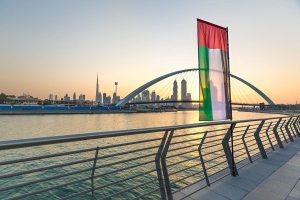Dubai has been ranked the third-best city in the world for digital nomads to live in, according to new research by real estate consultancy Savills.
Lisbon, the capital of Portugal, topped the table and Miami was ranked second in the Savills Executive Nomad Index, which lists the top 15 cities for long-term remote workers, based on internet speed, quality of life, climate, air connectivity and prime rents, Savills said in a statement on Wednesday.
Portugal’s popular Algarve region, in the south of the country, was ranked fourth, followed by Barbados in the Caribbean.
Barcelona, Dubrovnik, Saint Lucia, Malta and Antigua & Barbuda round out the top 10. No cities in Asia featured in the index.
“Remote working enabled business owners from abroad to make Dubai their main hub,” said Helen Tatham, head of residential community sales and leasing at Savills Dubai.
“UK nationals have long favoured Dubai for holiday and work, but the market also benefited from new demand from French, German, Swedish and Swiss buyers.”
The Covid-19 pandemic accelerated the remote-working trend, with the adoption of new technologies encouraging more workers to move away from the cities or countries where their employers are based.
In response, some countries, including the UAE, enacted legislation designed to attract foreign-employed workers.
The UAE unveiled a one-year residency permit for remote workers in March last year to attract more talent to the region and boost business opportunities. The visa permits foreign remote professionals to live in the Emirates while continuing to serve employers in their home countries.
Dubai topped the Savills index for air connectivity, with the emirate’s airlines reaching more than 100 countries, Savills said.
All cities that featured in the Savills index either have a digital nomad visa programme, or equivalent, or, in the case of US and European countries, are already part of a large economic bloc that allows free movement of people for living or work, the consultancy said.
They offer favourable climates year-round, a high quality of life and have established prime residential markets, Savills said.
“The modern executive nomad – a distant cousin of the freelance creative working from a cafe in Bali or Costa Rica – owns a villa in the Algarve or a condo in Miami, attends Zoom calls from an airy home office and hops on a flight back to London, New York or Geneva for the quarterly board meeting,” said Paul Tostevin, head of Savills World Research.
“Provided travel connections are good and high-speed internet is reliable, individuals and families are motivated to relocate and are placing a greater emphasis on health, wellness and overall lifestyle.”
Lisbon topped the index on the back of its high quality of life, low pollution, favourable climate and good air connectivity.
“Tech executives and entrepreneurs are drawn by Lisbon’s burgeoning status as a tech hub,” said Ricardo Garcia, head of residential at Savills Portugal.
“Real estate costs are low and there is a strong local talent pool. Companies are moving their headquarters to Portugal.”
Miami has grown in appeal as a remote working destination in the US owing to its warm climate and beaches, Savills said.
The city also offers good air connectivity and digital infrastructure, as well as a strong prime rental market and a comparatively good quality of life,.
Barbados, which has the fastest internet in the Caribbean, is popular with digital nomads thanks to its climate and good air connectivity.
Barcelona, which placed sixth, also has fast internet and a strong global connectivity through its air and rail systems, Savills said.
“As the workplace has evolved to a new, more flexible model, executive nomads are turning what were previously holiday home markets into year-round ones,” Mr Tostevin said.
“Certain locations in the Caribbean and Mediterranean, as well as cities such as Lisbon, Miami and Dubai, offer them connectivity, favourable climates and a high quality of life.”
Source: The National News






